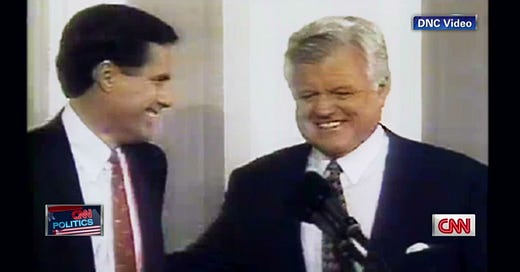The Importance of Campaign Debates
Debate skipping is another underminer of our American Democracy.
Feel free to check the entire blog archives from “Political Pulse” & “Salzillo Report” on the 2024 primary cycle, rural outreach, redistricting litigation, base dynamics, campaign organization, the current media landscape, the issues at stake, Project 2025, Build Back Better, the progressive movement, the true story about former 2024 VP contender Gina Raimondo, and much more.
Let’s put the 2024 election cycle in context first of all.
For optimistic Democrats and pessimistic Republicans, while the Harris Honeymoon may continue, do not be too distracted by the prize. The 2024 election is one that will be fought to the end at the ballot box. Talk of an electoral landslide is much premature at this point in time, though it might be sorely needed for democracy. But damn the polls.
Of course, the bigger an electoral victory is, the less likely it can be contested afterwards. Specifically, the less likely Donald Trump can try to overturn the 2024 election much like what he attempted back in 2020 because of how close it was across the country, and particularly in the 7 key swing states. Getting above 50 + 1, 218, and 270 is just plain old common sense.
JD Vance is gaining more headlines for a drag photo in college, proof of his record of ultra-masculinity. Meanwhile, the Vice President is planning to unveil her long-awaited agenda everyone has been waiting to see, supporters and opponents alike.
There is no question the Harris base is energized at this point compared to a month ago in Biden Country. However, recent analysis shows they have work to do in Trump Country, especially in Rural America. Could Minnesota Governor Tim Walz help shore up party organizing in Trump Country at least for this November? A big question for sure, especially for a problem that lingers back to the starving of the Democratic National Committee’s resources during the Obama years.
As for the long term health of American democracy, I am still very worried. The first poison into our system was with Citizens United. For all of the issues, there were real campaign finance laws on the books that would be wiped out by the United States Supreme Court in 2010. The result? Incumbents and candidates who raise the most money in an election cycle are the most likely to win (around 90% or so of all election contests).
The second? Plain old partisan & racial gerrymandering, which has effectively been endorsed and legalized also by the United States Supreme Court. Instead of the voters picking the lawmakers, it is very possible in many places that the lawmakers pick the voters. What you get from this is an elected aristocratic & oligarchic gerontocracy not fully representative of the people by any stretch. Our system of government is not strong if these new barriers are enshrined into our system of elections and government.
Complimenting these two developments has also been a recurring pattern of debate skipping. It is highly unlikely candidates can be forced to debate each other, but that did not have to happen before. Why? Because candidates running for public office wanted to debate to connect with the voters. They didn’t have to buy their way into office or rig the maps in a way that guaranteed their election. They actually had to speak to voters and tackle the big issues of the day if they really wanted to win anything.
Sure, televised debates & interviews don’t show everything. What you see on TV isn’t what most likely occurs in actual governance at any level of office. What it does show is whether a candidate takes seriously the concerns of American voters in a way they have to prepare to tackle the actual issues in public office. It shows courage as well. Moments like those in the debates of Kennedy-Nixon, Carter-Reagan, Clinton-Bush-Perot, Obama-Romney, and Trump-Biden tell a lot to voters about what kind of leader they want in charge.
Indeed, the current form of debates-the only one-does not satisfy everything. Different types of debates and interviews are highly encouraged instead. Like in Packwood-AuCoin in 1992 or Kennedy-Romney in 1994, campaign debates used to be much like actual debates. One of the candidates would ask a question for the other one to answer, and switch roles several times in the process for answers and rebuttals. Members of the audience could ask questions as well. Those debates offered a wide range of dialogue and memorable moments that are not as existent these days.
The relevance of traditional debates has decreased for another reason: the practice of debate skipping that only reinforces the partisan polarization that makes our elections more parliamentary in preference for parties than candidates. The current system today for incumbents, especially with Citizens United & Shelby County, and this year’s South Carolina map case, only reinforces it. Why bother debating if the maps are fixed from the get-go and you can outspend challengers on the airwaves? Why risk it? Why not just read speeches lazily off of a teleprompter? At the same time, why not debate if people merely vote on the D or R party label next to your name?
That was what happened in 2018 when incumbent Rhode Island Governor Gina Raimondo thought she was above the rules and didn’t have to debate her two primary challengers, former RI Secretary of State Matt Brown & State Rep. Spencer Dickinson. Indeed, she was partly right. Internal campaign polls in the state showed a tough primary challenge to Raimondo, which she would douse quickly with an $8 million war chest and by debate-skipping. Even with that, the protest vote in the Democratic primary was still above 43% collectively.
The lack of participation in traditional debates in recent years only hardens the parliamentary nature of American elections. In 2022, half of the congressional districts in the states of Iowa, Missouri, Kansas, and Nebraska had no debates of any kind. Notable Senate candidates like JD Vance, Ted Budd, Herschel Walker, and Adam Laxalt refused to debate their Republican or Democratic challengers for quite some time. Likewise with GOP election deniers like Doug Mastriano. Arizona Secretary of State Katie Hobbs remarkably refused to debate Kari Lake in the pivotal Governor’s race that year. Debate skipping also took place in Maryland and Massachusetts amongst both Republicans and Democrats.
Indeed, it seems Donald Trump is a bit afraid to debate Vice President Kamala Harris this time around as well, as he was afraid to debate say Ron DeSantis or Nikki Haley.
And yes, Missouri Senator Josh Hawley is chickening out of a debate this cycle with upstart challenger and former US Marine Lucas Kunce.
If you cannot debate your opponent for an hour or two, you probably should not run for office or be in elected office. Frankly, public service is something you have to devote more than an hour or two to. Every time a candidate refuses to debate, an empty chair should take their place.
While skipping a debate may not mean much to some people, it does tell a story of how other people prefer to make their own rules over engaging in the democratic process. That only damages our democratic system even further from its current struggles today.
But if you want to change that, regardless of party or ideology, make sure you vote more enthusiastically and more often.





